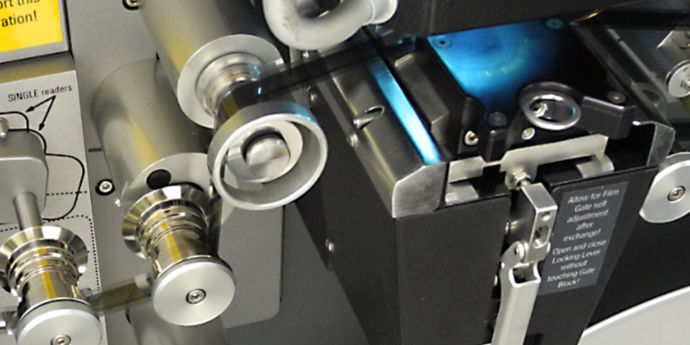It was not until 2012 that I was able to find time to arrange telecine transfers of the full length reels of the Tarax Show pantomimes.
However, things had changed drastically in telecine land since the Spirit Datacine test done by Larry at The Post Lounge in 2008.
Firstly, Larry had departed some years earlier and had not been replaced by another full-time telecine operator. The Post Lounge were now operating their Spirit Datacine on an as-needed basis using staff from their Brisbane office.
I was not reassured by this change, but it was a reflection of the wider changes sweeping through the film industry. Film technology was progressively being superseded by fully digital workflows.
So I started looking elsewhere. Was there another company in Australia that was still committed to providing a quality telecine service?
Some online research turned up a company in Sydney which claimed to have custom technology that used full-frame CCD scanning and produced the best results bar none. They had numerous glowing testimonials from satisfied customers.
We began an email exchange, but I had difficulty getting past salesmen who were good at providing quotes stuffed with promises such as the following:
“We have the highest quality 8mm, 16mm and 9.5mm film to Blu-ray, DVD and miniDV as well as various hi-def and std-def file format transfers on the planet. We service customers all around the world (with customers in over 40 countries) who desire the best quality from films that date back to the 1920s. Our revolutionary proprietary processing and individual frame by frame scanning provide unparalleled detail, clarity, contrast, sharpness and brightness.”
Despite my requests, they were unwilling to provide me with technical details about their system. In hindsight, this should have been a warning sign.
Nevertheless they claimed to be a professional outfit that did scanning work for television networks and national film archives around the world. Added to that, a contact of mine at the National Film and Sound Archive in Canberra gave them the thumbs up. And the idea of full-frame scanning was appealing.
So eventually I bit the bullet and advanced them $700 to cover scanning of one 50-minute reel, sent by post to Sydney.
I had high expectations for their results. But my high expectations were quickly dashed when I saw the video files. There were numerous, very obvious problems:
| Problem with Telecine Scan | Comment |
|---|---|
| The scan had a strong sepia colour cast and noticeable colour fringing. | The original (black and white) film has no colour cast. I had requested a pure black and white scan (i.e. no chroma). |
| Exposure was erratic, with frequent clipping (over-exposure) of white levels. | Tonal consistency on the original film was excellent throughout and there was no clipping of whites. |
| Framing was incorrect. The left hand edge of the frame had been cropped off, while the right hand edge was showing the film frame boundary. | A setup issue that should have been checked. |
| The audio drifted in and out of sync with the video. | It was in perfect sync throughout the original film. |
| The scan files had the wrong Pixel Aspect Ratio (PAR). |
How could this be? How could a business which did scanning work for national film archives produce such a flawed result?
Thus began a time consuming and drawn out process of negotiation with this company — trying to get them to deliver something that could be considered a professional quality result.
Every time they fixed one thing, they broke something else.

After nearly six months and three attempts on their part, I had to walk away from this experience.
It had cost me $700 plus many hours of time and a six month delay to this project.
Lesson learned. Don’t believe advertising hype. Always insist on up-front tests to confirm capabilities.
From now on I would insist on personally briefing technical staff and supervising the scanning work.
So the search was on again for a quality telecine service. What I didn’t realise was that in the era of digital production, film-related services were rapidly disappearing.
